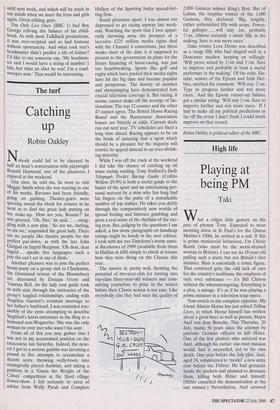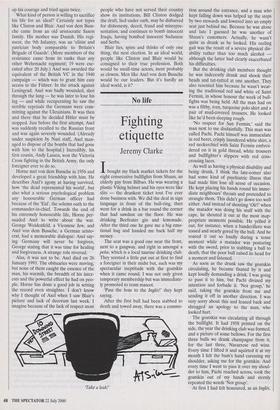High life
Playing at being PM
Taki
Now switch to the complete opposite. My friend Alistair Home has just edited Telling Lives, in which Horne himself has written about a great hero as well as person, Major Axel von dem Bussche. This Thursday, 20 July, marks 56 years since the attempt by patriotic German officers to kill Hitler. One of the few plotters who survived was Axel, although his earlier one-man mission would, had it succeeded, led to his own death. One year before the July plot, Axel, aged 24, volunteered to 'model' a new army coat before the Fiihrer. He had grenades inside the pockets and planned to detonate them, killing both Hitler and himself. (Hitler cancelled the demonstration at the last minute.) Nevertheless, Axel screwed up his courage and tried again twice.
What kind of person is willing to sacrifice his life for an ideal? Certainly not types like Clinton and Blair. Axel von dem Buss- che came from an old aristocratic Saxon family. His mother was Danish. His regi- ment, the 9th Infantry, was an 'elitist and patrician body comparable to Britain's Brigade of Guards'. (More members of the resistance came from its ranks than any other Wehrmacht regiment; 19 were exe- cuted after 20 July.) Axel was awarded the equivalent of the British VC in the 1940 campaign — which was to grant him easy access to the Fiihrer. In the attack against Leningrad, Axel was badly wounded, shot through the lung — he was later to lose his leg — and while recuperating he saw the terrible reprisals the Germans were com- mitting against the Ukrainians. It was then and there that he decided Hitler must be stopped. Just before the first attempt, Axel was suddenly recalled to the Russian front and was again severely wounded. (Already under suspicion by Nazi staff, Axel man- aged to dispose of the bombs that had gone with him to the hospital.) Incredibly, his first cousin, Andy Lassen, won the Victoria Cross fighting in the British Army, the only foreigner ever to do so.
Home met von dem Bussche in 1956 and developed a great friendship with him. He describes Axel's agony at having survived, how 'the dead represented his world', but also what a serious psychological problem any honourable German officer had because of the Eid', the solemn oath to the commander-in-chief. Towards the end of his extremely honourable life, Home per- suaded Axel to write about the war. George Weidenfeld, a Viennese Jew, and Axel von dem Bussche, a German aristo- crat, had a memorable dialogue: Axel say- ing Germany will never be forgiven, George stating that it was time for healing and forgiveness. A strange role reversal.
Alas, it was not to be. Axel died on 26 January 1993. The obituaries were moving, but none of them caught the essence of the man, his warmth, the breadth of his inter- ests and the powerful effect he had on peo- ple. Home has done a good job in setting the record even straighter. I don't know why I thought of Axel when I saw Blair's picture and lack of decorum last week. I imagine because of the lack of respect most 'Take a leak!' people who have not served their country show its institutions. Bill Clinton dodged the draft, lied under oath, may be disbarred for dishonesty, deceit, fraud and misrepre- sentation, and continues to bomb innocent Iraqis, having bombed innocent Sudanese and Serbs.
Blair lies, spins and thinks of only one thing, the next election. In an ideal world, people like Clinton and Blair would be consigned to their true profession. Both would be small-time actors, most probably as clowns. Men like Axel von dem Bussche would be our leaders. But it's hardly an ideal world, is it?



























































 Previous page
Previous page